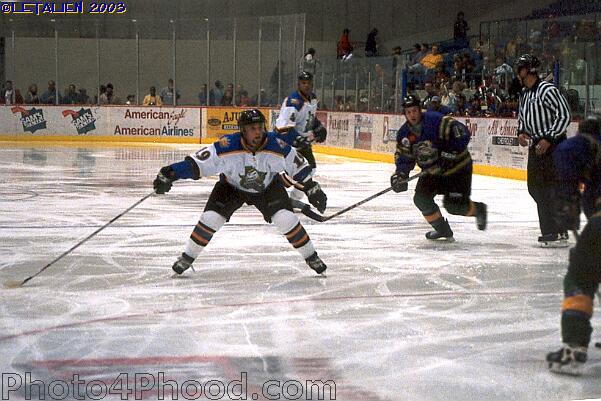Donskov Strength and Conditioning has built a niche over the years training hockey players. I would imagine my previous career in the sport (both at the college and semi-pro level) has led to the large influx of players and organizations entrusting DSC to train their athletes. I would also hope that my thirst for knowledge and professional experience in exercise science far surpasses my so-called career as a player. John Wooden once said “Don’t confuse professional experience with your ability to teach it.” Just because you played, doesn’t mean you’re a qualified coach. Although we take pride in our niche base of hockey players, I’ve never been a fan of what I would call “specificity overkill”, or sports specific overkill. Our job is defined, as Strength and Conditioning professionals not sport coaches. What’s the job of a strength and conditioning coach? Pretty simple; improve strength and conditioning qualities that can tangibly be carried over into competition! Some qualities overlap regardless of sport. Some do not.
- Strength: The ability to exert force against resistance.
- Conditioning: Building adequate levels of power and capacity of the bodies energy systems (anaerobic lactic, alactic, aerobic).
Specificity overkill or high-end sport training should be left for sport coaches, NOT strength coaches. Our job is to build athletes not definable sports skill/tactics (i.e. emulating sports demands on a BOSU ball).

Don’t apologize for Strength!
Strength is the foundation of speed, power and change of direction. Our hockey players Olympic lift, squat (single leg), trap bar dead lift, bench press, pull up ect. You may think that many of these exercises are used in a variety of sports to enhance strength and your assumptions are correct! We train athletes! Below are the fundamental movements in our programming for players. I have bolded the movements that I feel are important areas of focus in training today’s athletic population due to postural adaptations/asymmetries.
- Knee Dominant (single leg)
- Hip dominant
- Horizontal press
- Vertical Press
- Vertical Pull
- Horizontal Pull
- Loaded Carry
Don’t apologize for building strength in your athletic populations! This cannot be accomplished by stick handling blindfolded on a BOSU ball with a resistance cord strapped around your waist! Attempting to emulate tactical sport skills in the weight room (in my opinion) is a mistake. Don’t confuse skill set with strength and conditioning. One belongs on the ice/field, the other in the weight room.
The Case for “Sport Specific”
From my experience, there are two programming variables where sports specificity directly applies: Energy system development and movement capacity.
- Energy System Development: Most team sports (hockey, soccer, basketball, volleyball, ect.) are a combination of alactic-aerobic or lactic-aerobic energy system use consisting of a harmonic interaction between the ability to produce energy quickly for intense/explosive movements and the ability to recover efficiently and effectively. I believe there presents a case for specificity relating to sport, position, playing time, recovery time ect. Do goalies and forwards have the same energy demands? Does a fourth liner playing minimal minutes need additional energy system work? Do MMA fighters pose different conditioning needs than hockey players? I believe the answer to these questions brings up the need for “sport specific” energy system training. One size does NOT fit all.
- Movement Capacity: Sports not only require different mechanisms for energy expenditure/recovery, but they also pose differences in movement capacity, movement demands and asymmetry. Playing hockey in a fixed flexed position can lead to postural adaptations (tight/short hip flexors, tight pec. major/minor, weak posterior chain) that may be very different than the demands posed on the body during a soccer game or MMA fight. The need for a movement-based screen (FMS) is essential in attacking these issues and allowing athletes to move efficiently. During our time training hockey players we have seen trends in movement that can be directly related to the bodies fixed position during sport and daily living. Different sport, different position lead to different demands and adaptations placed on the body. With this information in hand, we simply can add mobility, stability and/or prehab exercises that directly attack these problems exposed in the screen. Different sports produce different problems.
At DSC, the majority of our clientele are hockey players’, but I’ve always said, “We build athletes!” There are many ways to skin a cat (linear periodization, alternating linear periodization, Block Training) and multiple variables that can be manipulated when training athletes. This is the responsibility of the knowledgeable strength coach who understands the demands of his/her sport. Please leave the “sport specific” skill teaching to sport coaches. We all hold our desired sport in high regard, but I feel many times we choose to make things to complex. Let’s get our athletes moving well, stronger, more powerful and in better shape. I think we as strength coaches can all agree on that…. regardless of sport!
Anthony Donskov, MS, CSCS, PES, is a former collegiate and professional hockey player, founder of Donskov Strength and Conditioning Inc., (www.donskovsc.com) and Head Instructor/Director of Off-Ice Strength and Conditioning for Donskov Hockey Development (www.donskovhockey.com). He can be reached at info@donskovsc.com .
Facebook: http://www.facebook.com/pages/Donskov-Strength-and-Conditioning-Inc/111694352189187
Twitter: http://twitter.com/Donskovsc